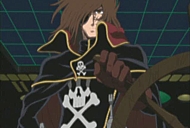
Space Pirate Captain Herlock: Endless Odyssey
The first decade of the 21st century has not been kind to anime. The advent of DVD got our hopes up about Western releases of anime, and boy, the market did get flooded...until recently, when distributors started folding like amateurs on the World Poker Tour. You can still see most anything you want if you have a fast enough computer and a Crunchyroll subscription, but it doesn't mean it's all good. In fact, it seems that both sides of the pond are realizing that right now, there's just not that much creativity going on in anime land.
Somehow, it's ironic to notice that a character who made his earliest debut in the mid-1950s (and his starring role in the 1970s) might actually be one of the freshest things on the market. Granted, Space Pirate Captain Herlock: Endless Odyssey is now over six years old, and it was released a few years ago in the United States. But the thing is, stories about Captain Harlock are timeless. The fearless captain of the Arcadia is one of the bright spots of the anime world even decades after he entered the scene. The latest incarnation of his story -- where his name is inexplicably spelled with an "e" -- is likely the best looking version of this story we'll see. I also have to state that this is by far the most entertaining Harlock story I've seen to date, and also the creepiest. Its has two minor flaws, in my opinion, but if you've never seen any Harlock material and have an aversion to older animation styles, this is the Harlock to see.
As the show begins, the Arcadia and its intrepid captain have disappeared into the void. His former crewmates are in dire straits as a totalitarian police force rounds up the remnants of Harlock's gang. The plan is to stage an execution in hopes to lure Harlock out of hiding. But as the Arcadia rumbles to life once again, the space police are really the last thing of major concern. A race of beings called the Noo once terrorized the galaxy, living off of the fear of other beings during the space/time foundation of the universe before they were imprisoned. Unleashed by an ill-fated expedition of scientists, the Noo alter dimensions and literally make the Earth disappear as part of their plan to rule the whole of space once again. Tadashi, the son of one of the scientists, is determined to avenge his father's death. He will get his wish as he embarks on a journey with Harlock where the fate of all we know lies in the balance.
While Herlock is not what you'd call astoundingly animated -- a trained eye will see that there are a lot of pans and money-saving techniques that get around actual movement in many scenes -- it is by far the most strikingly-rendered and beautiful piece of this saga created. Those who grew up with the laughable animation of the original TV series will probably be in awe at just how Herlock brings the original designs to life in a way that does them justice. The opening theme is a stirring instrumental, and I wound up watching it to set the mood over half the time -- and seeing that I usually skip OP/EDs, that's a good sign. (The ending theme is forgettable, but not terrible.) The score does a lot to lend atmosphere to the whole. Other than a few too-obviously-computer-aided pan shots in the first couple of episodes, Harlock fans should be well pleased at the technical merits.
What really makes Herlock work is that it is relaxed and confident. Renowned director Rin Taro is known to get into trouble without a good editor handy, but the 22-minute format seems to work very well for him. Hyperkenetic Tranformers beating the snot out of each other, this is not -- it is patient and methodical. But it really works, and while the proceedings may be a little slow at times, there's never a sense that things aren't being laid out precisely as planned. This is space opera orchestrated by someone of a different generation who's most interested in getting the tone right. That he does.
In fact, the one thing that might surprise previous Harlock viewers is just how creepy this show can get. Once you see what the Noo can do, you'll never make fun of their name again. They are a deadly enemy, capable not only of catastrophic destruction but also rendering the heart of an opponent into a broken mush of primordial fear. When you see midway through the series what they can do to a massive fleet of warships without themselves firing a shot, you realize that these guys are the Harlock universe's Borg...virtually unstoppable and determined to assimilate everything into their diabolical horror show. The show's violence is never gruesome, but these bad guys are truly intense.
But the show would be nothing without its title character, and Harlock is in fine form. He's still as stoic and taciturn as ever, but his darker side shows a little. He's not above shooting a man straight through the head when the need arises. Sometimes in the past, Harlock hasn't been much of a pirate...here, I believed it. This story is not about his character development -- we have the film My Youth In Arcadia for that -- but that of Tadashi, who grows into a man through the course of the tale. There's also a central theme of loss and recovery running throughout. The members of the Arcadia's crew are truly loyal to Harlock...they always have been, I suppose, but his absence made them realize just how much he meant to them all. It's nice to see some long-gone faces that haven't shown up in more recent endeavors like Harlock Saga make appearances. The bravery, heroism, sacrifice, and honor that Harlock stands for, and above all his code of "to thine own self be true," are in full view.
However, I would be amiss if I didn't mention a few things that are difficult to handle and take down the show a notch in my eyes, and they all have to do with issues of continuity and previous entries in the Harlock canon. First, while I appreciate Tadashi's story, we're seeing it...again. He's always a brash, youthful foil to Harlock, but if we're going to move forward in the overall timeline, it would have been nice to see him grown up, standing by the captain's side, and having some other character play the Luke Skywalker role. This messes with continuity big time. Granted, anybody familiar with Leiji Matsumoto's work knows that the man hasn't kept any of his major works consistent with one another, and frankly, continuity is much more important to Westerners than to Matsumoto's original audience. But still, this is not new material to us, and while it may play out differently than before at times, it's unnecessary.
The other issue that nagged me a little bit was that there's too much backstory left unsaid. This wasn't a huge problem for me, and it won't be for others who've been watching Harlock since they were in flannel pajamas with feet. But there are certain "payoff" moments here that are quite meaningful for long-time viewers that will be totally lost on newcomers. With literally just three to five minutes of backstory, the payoffs could have worked within this story itself without outside references. That strikes me as lazy scriptwriting. That doesn't mean that if this is your first Harlock show you will be lost...only that a certain poignancy will be missing from the experience.
All that said, if you're a fan of space opera at all, you really owe it to yourself to find a copy of this program. At 2009 prices -- right now, $4 a disc at RightStuf-- it'd be a shame to miss it. And what's more, while most Japanese space opera is pretty dated and cheesy by modern standards, this is not. If you've found yourself getting bored by one more moe no-show or the latest shonen stereotype, then I urge you to check it out. You really won't regret it.
Space Pirate Captain Herlock: Endless Odyssey -- violence, brief nudity -- A

